We recently posted about personal submarines. In browsing around in that market, we came across the “Seabreacher” and thought that it deserved a separate look. The Seabreachers by Innerspace are definitely the most brilliant, crazy, or perhaps a bit of both, personal watercraft out there. They are snorkel fed submersibles which can travel at up to 55 mph on the the surface and around 20 mph just below it. And just for the fun of it, or perhaps merely to mess with the minds of nearby whale watchers, one model looks rather like an orca. Additionally, the “orca” model, Seabreacher Y, can be outfitted with riding pegs and a handlebar attachment to allow a stunt man to ride on the back and perform tricks. The Seabreacher X looks a bit like a shark. The non-orca or shark Seabreachers look like something from a James Bond movie. They also have a “Dolphin” Seabreacher which Innerspace has used as a “a research and development platform ” but is not in commercial production. Prices start at US$ 65,000 for a standard model and at US$ 81,000 for the orca-like Model Y.
Killer Whale Seabreacher Watercraft
[iframe: width=”480″ height=”360″ src=”http://www.youtube.com/embed/7SUHOjnkmlI” frameborder=”0″ allowfullscreen]
Seabreachers are Coast Guard approved as personal watercraft. The manufacturers “strongly recommend that a support boat is present whenever you operate a Seabreacher. This is not as much for the Seabreacher but more to help keep other boaters or water users from coming too close to the vessel when it is operating. We also recommend having radio communication between the vessel and chase boat as an added precaution. We continue to use a support boat every time we go out, even after ten years of operation.”
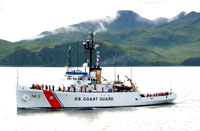 Last March we posted that the U. S. Coast Guard Cutter Acushnet, the oldest commissioned Coast Guard cutter, was being sold in an online auction. The ship was reportedly sold to an unidentified buyer. The ship has now been put up for auction on EBay by “masterbushpilot0.” The “Buy It Now” price has been set at $10,000,000. The current highest bid is $27,100 and the reserve price has not been met. The auction ends in four days.
Last March we posted that the U. S. Coast Guard Cutter Acushnet, the oldest commissioned Coast Guard cutter, was being sold in an online auction. The ship was reportedly sold to an unidentified buyer. The ship has now been put up for auction on EBay by “masterbushpilot0.” The “Buy It Now” price has been set at $10,000,000. The current highest bid is $27,100 and the reserve price has not been met. The auction ends in four days.

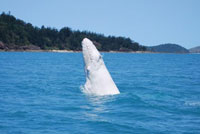
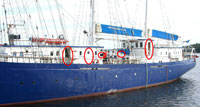

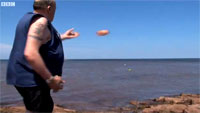 Harold Hackett of Prince Edward Island started throwing bottles with messages inside into the Atlantic Ocean in 1996. Since then he has cast 4,800 bottles into the sea and has received 3,100 responses. He has received letters back from Africa, Russia, Holland, the UK, France, Scotland, Ireland, parts of New England, Florida, Norway and even the Bahamas. His response rate may be better than the average “Friend” request rate on Facebook. Click the link below for a BBC interview of Mr. Hackett.
Harold Hackett of Prince Edward Island started throwing bottles with messages inside into the Atlantic Ocean in 1996. Since then he has cast 4,800 bottles into the sea and has received 3,100 responses. He has received letters back from Africa, Russia, Holland, the UK, France, Scotland, Ireland, parts of New England, Florida, Norway and even the Bahamas. His response rate may be better than the average “Friend” request rate on Facebook. Click the link below for a BBC interview of Mr. Hackett. In February 2010, the
In February 2010, the 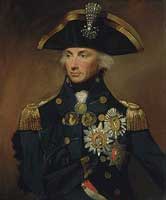 Two hundred and fifty three years ago today,
Two hundred and fifty three years ago today, 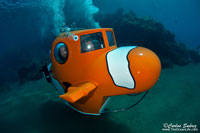

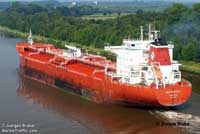

 In August, Diana Nyard attempted to become the first person to swim from Cuba to Florida
In August, Diana Nyard attempted to become the first person to swim from Cuba to Florida Today, we have three posts about dolphins and humans interacting. I went to high school on the Gulf Coast of Florida, which has some of the largest bottlenose dolphin populations in the world. When I am in Florida visiting family, I always look forward to kayaking between the mangrove islands of Boca Ciego Bay where pods of dolphin and porpoise fish and play along the edges of the channels, often swimming around and under my kayak. Magnificent creatures. On Friday, Warner Brothers released
Today, we have three posts about dolphins and humans interacting. I went to high school on the Gulf Coast of Florida, which has some of the largest bottlenose dolphin populations in the world. When I am in Florida visiting family, I always look forward to kayaking between the mangrove islands of Boca Ciego Bay where pods of dolphin and porpoise fish and play along the edges of the channels, often swimming around and under my kayak. Magnificent creatures. On Friday, Warner Brothers released
